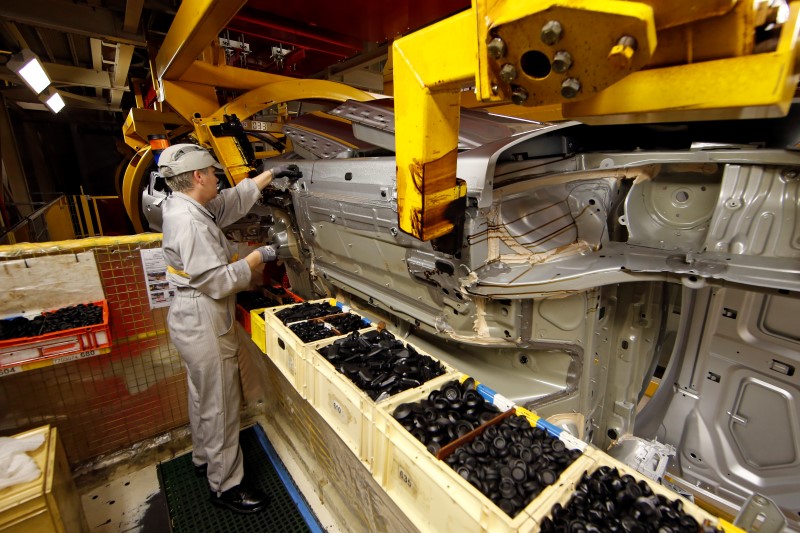* Manufacturing weakness across the world points to poor Q1
* Euro zone factories cut prices at steepest rate since mid-2013
* China surveys indicate further contraction, more job losses
* More China policy easing steps expected
By Jonathan Cable and Ian Chua
LONDON/SYDNEY, March 1 (Reuters) - Manufacturing activity across much of Asia shrank in February while factory growth waned throughout Europe, dealing a further blow to policymakers who are struggling to stimulate their economies and spur inflation.
Chinese producers suffered a seventh straight month of decline in February, a Purchasing Managers' Index (PMI) survey showed just a day after the People's Bank of China resumed a policy easing cycle in a fresh effort to drive growth.
Sister surveys showed factories in the euro zone raised production at the weakest pace for a year as deep discounting failed to put a floor under slowing orders growth. Their British counterparts had their worst month in nearly three years.
A survey of manufacturing output from the United States due later on Tuesday is likely to show a fifth straight month of contraction there. None of the 88 economists polled by Reuters expected growth. reuters://realtime/verb=Open/url=cpurl://apps.cp./Apps/econ-polls?RIC=USPMI%3DECI
"If you were looking for evidence of manufacturing growth stabilising then this isn't it. There were a couple of low spots that are quite surprising," said Philip Shaw at Investec.
"(But) to get a fuller picture of what is going on we will have to see evidence from the service sector." Monthly service industry PMI surveys are due later this week.
Tuesday's downbeat data may sharpen the focus of officials from the world's leading economies who declared at a weekend G20 meeting they needed to look beyond ultra-low rates and printing money to reanimate growth. Monday, the PBOC announced it was cutting the amount of cash banks must hold as reserves for the fifth time since February 2015 yet analysts expect it will have to do more, including cutting interest rates this year. the latest move, we add another 50 basis point RRR cut, and continue to look for two rate cuts in the first half of 2016," analysts at Barclays (L:BARC) Capital wrote to clients.
"Risks to our 6.0 percent baseline GDP growth forecast in 2016 remain tilted to the downside."
The euro zone has been facing similar travails and although the overall expansion was slightly better than previously thought, Markit's manufacturing PMI will make gloomy reading for the European Central Bank ahead of next week's policy meeting.
The survey showed factories cut prices at the steepest rate since mid-2013. The ECB wants inflation near 2 percent but prices across the bloc fell 0.2 percent last month, short of already depressed expectations and virtually ensuring another round of policy easing. additional cut to the ECB's deposit rate is almost certain on March 10 and there is an even chance the central bank will increase the size of its 60 billion euros a month bond buying programme, a Reuters poll found last month. ECILT/EU
Australia's central bank governor, Glenn Stevens, observed on Tuesday that conditions have become more difficult for a number of emerging market economies and noted "China's growth rate has continued to moderate".
Stevens, who attended the Shanghai G20 meeting, made those comments after the central bank left interest rates at a record low 2.0 percent. TOOLS
Survey after survey served to remind how challenging the current environment is.
Markit's manufacturing PMI for the euro zone dropped to 51.2 from January's 52.3. That was slightly better than an earlier flash estimate of 51.0 and above the 50 mark that separates growth from contraction. EUR/PMIM
German manufacturing plunged to a 15-month low of 50.5 from January's 52.3, while activity in Britain, outside the euro zone, tumbled to 50.8, below all the forecasts in a Reuters poll of economists, from 52.9. GB/PMIM
Manufacturers from China to Indonesia showed no signs of reversing a weakening trend, forcing factories in the trade-reliant region to shed yet more jobs and cut prices, a move that could worsen a global disinflationary trend.
Japan's factories saw their weakest growth in eight months, while Indonesia and Malaysia contracted for the 17th and 11th month respectively, according to Markit. Taiwan went into reverse gear for the first time in three months as orders wilted.
India was perhaps the only standout, and for merely maintaining modest growth driven by cutting prices to attract demand.
By contrast, China's official PMI stood at 49.0 in February, down from 49.4. A private survey, the Caixin/Markit China PMI, which focuses on small and mid-sized companies, fared no better, falling to 48.0, from 48.4, and undershooting market expectations of 48.3. said some of the weakness in China's PMIs was probably due to the long Lunar New Year holidays, but pointed to a worrying fall in the index's employment gauge which dropped to its lowest since January 2009. big question is do we see a pick up in the second quarter once China does pass through the seasonal disruption, but at the moment there is little hope for that to happen in any significant way," said Angus Nicholson at brokerage IG.
Underscoring how a slowdown in China is putting trade-reliant economies on the skids, South Korean exports in February tumbled in their 14th consecutive month of declines. by Richard Borsuk)
